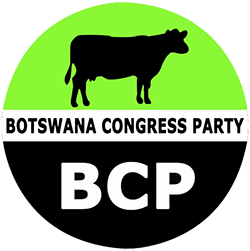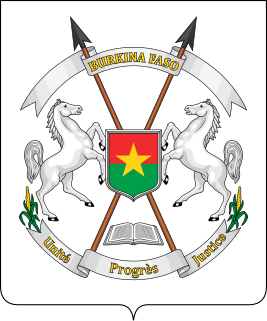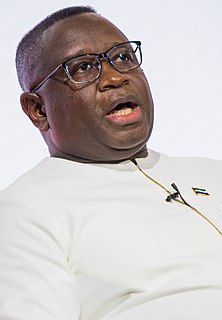The politics of Tanzania takes place in a framework of a unitary presidential democratic republic, whereby the President of Tanzania is both head of state and head of government, and of a multi-party system. Executive power is exercised by the government. Legislative power is vested in both the government and parliament. The party system is dominated by the Chama Cha Mapinduzi. The Judiciary is independent of the executive and the legislature.

The Pan Africanist Congress of Azania is a South African national liberation Pan-Africanist movement that is now a political party. It was founded by an Africanist group, led by Robert Sobukwe, that broke away from the African National Congress (ANC), as the PAC objected to the ANC's "the land belongs to all who live in it both white and black" and also rejected a multiracialist worldview, instead advocating a South Africa based on African nationalism.

Joseph Leabua Jonathan was the second prime minister of Lesotho. He succeeded Chief Sekhonyana Nehemia Maseribane following a by-election and held that post from 1965 to 1986.

The Botswana Congress Party (BCP) is a political party in Botswana. The BCP was founded in 1998 in a split from the Botswana National Front, with most of the BNF's sitting Members of Parliament joining the new party after a leadership dispute with Kenneth Koma. MPs who helped found the party included Michael Dingake, Gilson Saleshando, Paul Rantao, Maitshwarelo Dabutha, Isaac Mabiletsa and Vain Mamela. The BCP's first national conference was held in April 1999, before the general election in October 1999.

The National Assembly is the directly elected house of the Parliament of South Africa, located in Cape Town, Western Cape Province. It consists of four hundred members who are elected every five years using a party-list proportional representation system where half of the members are elected proportionally from 9 provincial lists and the remaining half from national lists so as to restore proportionality.

The Parliament of Eswatini is bicameral, consisting of a lower chamber and an upper one. Some of the members of both chambers are elected, while the rest are appointed by the King of Eswatini. Election is by secret ballot in a first-past-the-post system of voting. Members of both chambers serve for five-year terms. All candidates run on a non-partisan basis, as political parties are banned.

The Pan-Armenian National Movement or Armenian All-national Movement was a political party in Armenia.

Seif Sharif Hamad was a Tanzanian politician who served as the First Vice President of Zanzibar and as Party Chairman of ACT Wazalendo. He was the secretary-general of the opposition Civic United Front (CUF) party and First Vice President of Zanzibar until 18 March 2019 when he announced his resignation from CUF and joined Alliance for Change and Transparency. He was given an ACT Wazalendo card number One, and he also won the party nomination for the 2020 presidential candidate for Zanzibar.

Edward Ngoyai Lowassa is a Tanzanian politician who was Prime Minister of Tanzania from 2005 to 2008, serving under President Jakaya Kikwete. Lowassa has gone into record as the first Prime Minister to have been forced to resign by a fraud scandal in the history of Tanzania. Following his resignation President Kikwete was obliged to dissolve his cabinet as required by the Constitution and with minimum delay, constituted a new one under a new Prime Minister, Mizengo Pinda.

General elections were held in Mexico on 6 July 1988. They were the first competitive presidential elections in Mexico since the Institutional Revolutionary Party (PRI) took power in 1929. In all previous presidential elections, the PRI had faced no serious opposition and had won with percentages of votes well over 70%.
John Nyathi "Poks" Pokela was a South African political activist and Chairman of the Pan Africanist Congress (PAC).

The Swaziland Progressive Party was the first political party founded in Swaziland.

The Alliance Party was a political coalition in Malaysia. The Alliance Party, whose membership comprised United Malays National Organisation (UMNO), Malaysian Chinese Association (MCA) and Malaysian Indian Congress (MIC), was formally registered as a political organisation on 30 October 1957. It was the ruling coalition of Malaya from 1957 to 1963, and Malaysia from 1963 to 1973. The coalition became the Barisan Nasional in 1973.

Parliamentary elections were held in Burkina Faso on 2 December 2012. They were the first elections held since the National Assembly dissolved the National Electoral Commission in 2011, following fraud allegations concerning the 2010 presidential elections. Municipal elections for over 18,000 councillors were held simultaneously. The elections were held amidst a period of political uncertainty, following protests against President Blaise Compaore's regime.

The All Progressives Congress is one of the two major contemporary political parties in Nigeria, along with its main rival, the People's Democratic Party. It was founded on 6 February 2013.

General elections were held in Tanzania on 25 October 2015. Voters elected the president, members of Parliament, and local government councillors. By convention, the election was held on the last Sunday of October and was supervised by the National Electoral Commission (NEC). Political campaigns commenced on 22 August and ceased a day before the polling day.
The Lesotho Liberation Army (LLA) was a guerrilla movement in Lesotho, formed in the mid-1970s and connected to the anti-Apartheid Azanian People's Liberation Army (APLA). It was the armed wing of the Basutoland Congress Party (BCP), a pan-Africanist and left-wing political party founded in 1952, which opposed the regime of Prime Minister Leabua Jonathan.

General elections were held in Sierra Leone on 7 March 2018 to elect the President, Parliament and local councils. Incumbent President Ernest Bai Koroma did not run for another term, as he was constitutionally ineligible, having served the maximum ten years in office.

General elections were held in Tanzania on 28 October 2020 to elect the President and National Assembly. The presidential election was won by incumbent John Magufuli of the Chama Cha Mapinduzi party.

Presidential elections were held in Malawi on 23 June 2020, having originally been scheduled for 19 May and later 2 July. They followed the annulment of the results of the 2019 presidential elections, in which Peter Mutharika of the Democratic Progressive Party had received the most votes.















